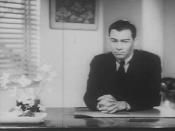When we try to define human nature, we must consider the balance of both good and evil or light and dark. Many times these qualities exist simultaneously and maintain a balance, but sometimes this stability is lost and the "darker side" surfaces. Have you ever wondered what it takes to push someone over the edge? In Edgar Allen Poe's "The Tell-Tale Heart," the narrator posses four qualities of mental instability that seem to contribute to his horrible crime - nervousness, delusions of grandeur, violence, and auditory hallucinations.
The first and perhaps most obvious symptom of mental illness exhibited by the narrator is nervousness. This nervousness is apparent in the first line of the story: "True! - nervous - very, very dreadfully nervous I had been and am; but why will you say that I am mad"(34)? The narrator seems nervous because he does not want the reader to think that he is mad.
It is very important to him that the reader sees what effort he has put into the crime. I find it interesting that the narrator feel the need to defend his sanity in the first line of the story, because the reader does not yet know the details of the story. We see this nervousness again on the eighth night as he is staring at the "vulture eye" (34). He describes the beating of the heart, and he attributes it to the terror that the old man is feeling. He is in fact hearing the beating of his own heart. He says "I have told you that I am nervous: so I am"(35). In his nervousness, the sound of the beating heart "incited me to uncontrollable terror"(36). His nervousness that a neighbor may hear the sound urges him to kill the man. The fact...



Tell-tale heart
Poe adds to the craziness of the speaker in "The Tell-Tale Heart," when the speakers spends all night slowly sticking his head into the old man's door, more slowly than a clock's minute hand. The story on a whole really reminds you of Hitchcock and how he ended "Psycho," with the man on the chair with a fly on his arm, saying "I wouldn't hurt a fly," trying to convince you of his innocence. Talk about plagiarism.
4 out of 7 people found this comment useful.